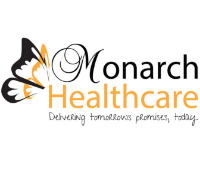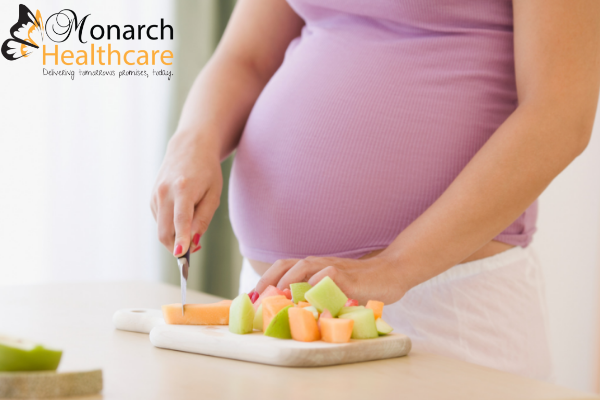Remember that OB appointment around 24 weeks… yep, the one with the glucose drink (yummy!) and then hanging out in the office for an hour. You remember. The test is routine and incredibly important!
That glucose test tells your doctor how well your body is producing insulin to keep blood sugar levels in check. A gestational diabetes diagnosis is important and should be addressed to ensure the health of mom and baby.
We had a chance to talk with Megan Donnelly, a registered dietician at Monarch Healthcare, about what we should ALL understand about that glucose drink and our nutritional needs during pregnancy. Megan has been working with expecting mothers for five years as a dietician and Certified Diabetes Educator. She is, also, a lactation specialist at EIRMC. As a mother to two young children herself, she understands the importance of being sure mom is taking care of herself during and after pregnancy.
Here are some questions every expecting mother should know the answers to:
First things first, what is gestational diabetes? 
Diabetes is a condition in which the body does not produce enough (or effectively use) insulin to keep blood sugar levels at a healthy, stable level. Without enough insulin, sugar stays in the blood instead of moving into cells to be used as energy, and we end up with high blood sugar. “Gestational” simply means during pregnancy. So, the expecting mother did not have diabetes prior to pregnancy.
So, why test everyone?
Starting at around 24 weeks gestation, our bodies become more resistant to insulin and don’t necessarily use insulin appropriately. For some of us, we may have had some insulin resistance prior to pregnancy. The increase in hormones that affect how well our body uses insulin means it’s not uncommon to develop diabetes during pregnancy.
Are some mothers at a higher risk of developing gestational diabetes?
While anyone could develop gestational diabetes, there are some factors that could put you at a higher risk. Some of those include: a history of gestational diabetes in prior pregnancies, a family history of the condition, weight, and age. Most women who develop gestational diabetes do not have symptoms, so it is important for all to be screened.
Why is it important to determine if I have gestational diabetes?
If left untreated, high blood sugar can have serious risks for mom and baby. Risks for baby include an increased birth weight. If mom’s blood sugar is high, so is baby’s. This causes their tiny pancreas to produce more insulin which causes them to grow larger which could lead to complications during birth. Baby could, also, experience low blood sugar after birth since it’s pancreas has been on overdrive during pregnancy. Jaundice and infant respiratory distress syndrome are also at an increased risk.
For mom, high blood sugar during pregnancy could lead to pre-eclampsia and high blood pressure. Mom’s with gestational diabetes also have a higher percentage of c-sections, so it is always good to work with your doctor to plan for the safest birth for mom and baby.
What should I expect from the test?
Sometime around 24 weeks during your routine appointment will be your gestational diabetes screening. You will drink a lovely beverage with 50g of carbs and then hang out for an hour. There will then be a simple blood test to check your blood sugar. If it’s all good – you pass. If not, there will a follow-up test. The follow-up test is a drink with 100g of carbs and a 3-hour wait.
What happens if I am diagnosed with gestational diabetes?
Once diagnosed, at Monarch Healthcare, you will meet with Megan for a dietary consultation. She will chat with you about the best ways to regulate blood sugar levels with your diet. She’ll discuss ways to control carbohydrates throughout the day and create a personalized “carb-budget.” You’ll test your blood-sugar at home and talk with her regularly to adjust and make a plan that works for you. Megan is available in the office, and also emails and texts regularly as wonderful support to expecting moms. The majority of mothers are able to control blood sugar with diet, but insulin injections and oral medication may be prescribed if needed.
What should I remember after pregnancy?
For many with gestational diabetes, blood sugar levels regulate themselves shortly after baby is born. But, there are some things to remember and consider. You will be at high risk for gestational diabetes in any following pregnancies (plus you’ll be older – another risk factor), so you may have a screening earlier in the pregnancy. Also, women who have gestational diabetes are 7 times more likely to develop type 2 diabetes than women who did not have it during pregnancy. Staying active and at a healthy weight can lower that risk. Breastfeeding can also lower the risk of developing type 2 diabetes. Women with gestational diabetes who do not nurse have a 2x higher risk of developing type 2 diabetes after pregnancy.
So, raise your “glucose drink” glass to the mom in the waiting room with you and know that you are taking the best care of yourself and your baby! No matter the result, YOU are doing exactly what you need to be doing to keep yourself and baby as healthy as possible.
 Monarch Healthcare
Monarch Healthcare















